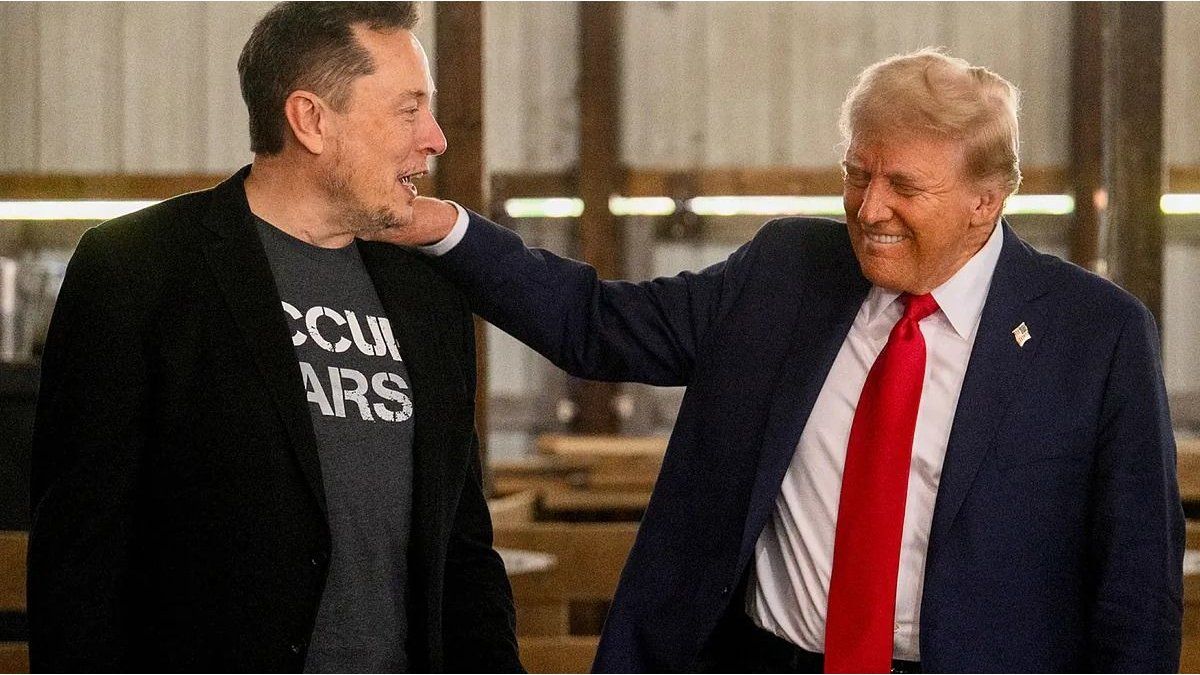Elon Musk and Javier Milei.jpg
Musk and Milei in Silicon Valley.
The origins of the alliance: money, data and speech
The relationship between Donald Trump and Elon Musk was not the product of a deep ideological affinity, but an instrumental convergence between political power and technological capital. During the 2016 presidential campaign, Musk supported Trump indirectly by favoring the circulation of disruptive narratives on social networks such as Twitter, thus facilitating the capture of public care by the then Republican outsider. Subsequently, The link was strengthened with explicit agreements for cooperation, tax benefits for Musk companiesand a strong media alliance based on the amplification of related speeches.
Elon Musk understood that political power could be an accelerator for its corporate objectives; Preferential access a state contracts, regulatory freedom for their companies (especially Spacex and Tesla)and global visibility as a visionary of the 21st century. For his part, Trump saw in Musk not only a strategic ally, but a symbolic validation against business elites. It was, in essence, a relationship based on the classical idea of functional corporatism; A state managed by entrepreneurs for entrepreneurs.
However, as we warn in “technological libertarism and power” (Tigani, 2024, Academia.edu), this alliance was full of contradictions. Musk did not represent traditional capitalbut a new form of technopolitical actor whose rationality was not guided by the incremental logic of productive investment, but for the show, disruption and megalomania. This essential difference between classical industrial capitalism and emerging technoplutocracy was the germ of the conflict.
Twitter as vertebra of the ideological ecosystem
The acquisition of Twitter by Elon Musk in 2022 should be read as a political act rather than economical. Musk turned the platform into an ideological laboratory where he experienced with models of censorship, selective validation of discourses and algorithmic manipulation. As we held in “Between freedom and algorithm” (Tigani, 2023, Academia. Edu), Twitter became the symbolic headquarters of the cultural power of a new global reactionary right.
The reopening of the account Trump after the assault on the Capitolthe authorization of ultraconservative influencers Previously expelled, and the conversion of the algorithm into a functional editorial device to the libertarian narrative, marked a turning point. Twitter/X ceased to be a social network to become an ideological device.
But this transformation was not exempt from costs. The advertising divestment, the loss of value of the brand, the massive output of users and the fall in institutional credibility showed that symbolic capital cannot be sustained only with radicalization. Thus, the network that catapulted Trump to the presidency in 2016, ended up becoming anist that weakened his electoral return.
The capture of the State and its limits: Musk in public machinery
During his brief formal incursion into public management, Musk was designated by Trump as Director of Ephemeral “Government Efficiency Department”a structure created ad hoc to transfer corporate logics to the State. Under that symbolic but strategic function, Musk promoted an agenda of extreme austerity, mass layoffs and dissolution of organisms. His actions replied the business optimization ethos of resources, reduction of personnel and outsourcing, under the promise of a “light” but efficient state.
However, as has been demonstrated in critical literature (Krugman, 2012; Harvey, 2005; Mazzucato, 2018), The logic of private management is not applicable to public institutions without generating deep dysfunctions. As argued in “Elon Musk, Dogecoin and the fragility of financial rationality” (Tigani, 2023, Academia.edu), his vision of the state was that of a start-up in ministerial version; Obsessive with efficiency, indifferent to the social contract.
The reaction was immediate. The protests of the movement “Hands outside!” In Washington, with slogans such as “do not touch our rights” and “the State is not a company”They marked the beginning of the end for their political career. Musk was displaced from the position with discretion, but the damage was already done; The direct corporate management experiment in the state had failed loudly.
Failure as a structure: disorder, protest and ostracism
Musk’s failure cannot be read as an isolated episode. It represents the collapse of a logic that confuses performative power with governance. From an anthropological perspective, Musk Encarna the archetype of the priestly technote; a messianic actor who is considered illuminated by algorithmic reason to redesign society. But in politics, legitimacy is not decreed from a Twitter account, but is built through institutional, symbolic and collective processes.
The protests against their policies, which included mass demonstrations in universities, unions and media, marked a point of no return. His figure went from being an aspirational icon to an institutional threat symbol. Even among conservative voters, the perception that Musk did not represent the American “self-made”, but to a Digital despot.
The Trump administration, in a pragmatic movement, sealed its destination. Musk was excluded from future electoral alliances. As sources from the former president’s intimate circle revealed, the internal perception was that Musk wanted to “govern without going through the vote” (NYT, 2025). It was the definitive step towards the political ostracism of the tycoon.
Crisis of legitimacy and symbolic power
The Musk case is paradigmatic of a broader crisis; that of technoplutocracy as an emerging power model. In “Technoplutocracy: power, control and the emergence of a new elite in capitalism” (Tigani, 2024, Academia.edu), it was already noted that the accumulation of data, digital infrastructure and financial capital does not guarantee political legitimacy. The logic of the platforms, based on the extraction and manipulation of behaviors, collides with the demands of the republican contract.
In this sense, Musk’s failure represents a epochal warning. The dissolution of the border between company and state does not produce virtuous synergies, but irresoluble tensions. The corporate capture of the public apparatus erodes its legitimacy and deactivates its distributive function. What Musk tried to install as an algorithmic government became a crisis of authority and popular rejection.
As authors such as Zuboff (2019) and Acemoglu & Robinson (2023) have pointed out, power is not only measured in terms of control capacity, but also social acceptance. Technoplutocracy, lacking democratic mediations, isolates itself in its own autojustification bubble, losing connection with collective imaginary.
Can capital govern without mediations?
The Trump-Musk rupture should not be seen as another anecdote of the present hypermediatized, but as a historical warning. Capital, when tries to govern without mediations, fails. It does it because it does not understand the complexity of the social bond, because it underestimates the symbolic dimension of power, and because its logic of accumulation is incompatible with that of redistribution.
This article, aims to demonstrate, with an empirical and theoretical basis, that Tecnoplutocracy does not constitute a viable alternative for democratic governance. Your promise of efficiency becomes chaos.
Faced with this scenario, it is urgent to rethink the place of the chainsaw in democracy. It is not about denying the search for efficiency, but about building institutional and cultural frameworks that limit their power, democratic their effects and restore citizenship sovereignty over the means of social organization.
As Paul Krugman (2012) already warned, “a country is not a company.” Today we can add: “… and a social network is not a republic.”
Director of Esperanza Foundation. https://fundacionesperanza.com.ar/ UBA postgraduate professor and masters in private universities. Master in International Economic Policy, Doctor of Political Science, Author of 6 Books
Source: Ambito
David William is a talented author who has made a name for himself in the world of writing. He is a professional author who writes on a wide range of topics, from general interest to opinion news. David is currently working as a writer at 24 hours worlds where he brings his unique perspective and in-depth research to his articles, making them both informative and engaging.




